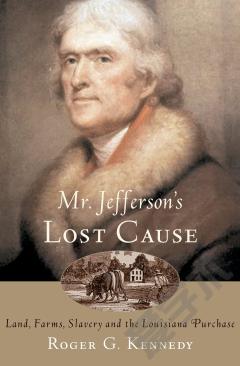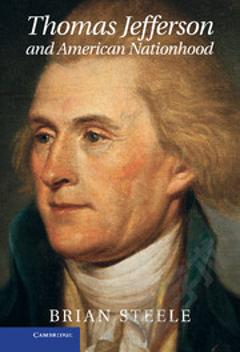Mr. Jefferson's Lost Cause —— Land, Farmers, Slavery, and the Louisiana Purchase
----- 杰斐逊先生的失败原因:土地,农民,奴隶制和路易斯安那购买
Mr. Jefferson's Lost Cause: Land, Farmers, Slavery, and the Louisiana Purchase. By Roger G. Kennedy. (New York: Oxford University Press, 2003. Pp. xiii, 350. Chronology, illustrations. Cloth, $30.00.)Mr. Jefferson's Lost Cause shares both the strengths and the weaknesses of Roger G. Kennedy's other forays into the history of the early republic-Burr, Hamilton, and Jefferson: A Study In Character (2000), Hidden Cities: The Discovery and Loss of Ancient North American Civilization (1994); and Orders from France: The Americans and the French in a Revolutionary World (1990). A swirl of environmental, intellectual, political, diplomatic, business, and social history, Mr. Jefferson's Lost Cause is written in a style that is unmistakably Kennedy's own. Intended for both a popular and an academic audience, it will probably intrigue and infuriate each in its own way.What Kennedy does especially well in this book, as in all of his books, is to revisit a familiar story with an eye to hitherto unseen connections and forgotten characters. Accordingly, this book is as much about Creek nationalism, American expansionism, and British mercantilism as its ostensible topic: the spread of plantation slavery and cotton agriculture across the American South. Kennedy develops often-unexpected linkages between these-and other-developments, creating a rich web of stories. And he finds individuals who personify these linkages. Jefferson may receive top-billing in this book, but Kennedy devotes nearly as much attention to the self-proclaimed Creek chief Alexander McGillivray, the powerful Indian trader William Panton, and the minor American diplomat Fulwar Skipwith.But this book also suffers from the same shortcomings as its predecessors. The organization is idiosyncratic, with the author generally providing little advance warning of its many twists and turns. The citations are to what Kennedy describes, with joyous disdain for standard scholarly practice, as "the most accessible source"-generally partial quotations reproduced in monographs and articles rather than complete documents in microfilmed or published collections (307). As a result, many of his quotes lack the context that would help to explain them. The book also is rife with basic factual errors. Kennedy discusses the end of slavery in Delaware as something that occurred at the turn of the nineteenth century (54), refers to Federalist domination of Congress in 1783 (65), and suggests that Jefferson was angling for the presidency in 1785 (75). And, even though all of his quotes on the subject come from early 1804, Kennedy dates the Hillhouse debates over slavery in Louisiana to 1805-06 (210-13). Most distressingly, Mr. Jefferson's Lost Cause displays Kennedy's tendency to dismiss any evidence that contradicts his own view. The moralizing is heavy-handed, and any mitigating circumstances that might rescue its targets from opprobrium are either heavily discounted or entirely ignored.Kennedy directs his anger at Jefferson, blaming him for the spread of slavery and, ultimately, for the Civil War. According to Kennedy, "the most important choices made by any single statesman for the future of the South arose from the preferences, prejudices, and policies of Thomas Jefferson" (236). "Different outcomes" in the various contests over the expansion of slavery in the opening decades of the nineteenth century, he argues, "might have . â¦
{{comment.content}}








 京公网安备 11010802027623号
京公网安备 11010802027623号